|
Progressive Men of
Minnesota
Minneapolis Journal
1897
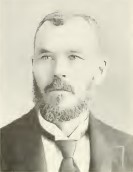 CLARENDON DWIGHT BELDEN of Austin,
Minnesota, was born at Fruit Hill, just north of
Providence, Rhode Island, May 3, 1848. His father,
Stanton Belden, was born and reared in
Saudisfield, Massachusetts, and graduated at Yale
college in the class of 1833, and his professional
life of thirty-five years was spent as principal
of the Fruit Hill Classical Institute. Stanton
Belden’s mother was Prudence Sholes, of Groton,
Connecticut, and her father, Nathan Sholes, a
Revolutionary soldier, was killed while defending
Fort Griswold. CLARENDON DWIGHT BELDEN of Austin,
Minnesota, was born at Fruit Hill, just north of
Providence, Rhode Island, May 3, 1848. His father,
Stanton Belden, was born and reared in
Saudisfield, Massachusetts, and graduated at Yale
college in the class of 1833, and his professional
life of thirty-five years was spent as principal
of the Fruit Hill Classical Institute. Stanton
Belden’s mother was Prudence Sholes, of Groton,
Connecticut, and her father, Nathan Sholes, a
Revolutionary soldier, was killed while defending
Fort Griswold.
The mother of Clarendon
Dwight Belden was Antoinette Percival Manchester,
of Fall River, Massachusetts, and on the
Manchester side, the family lineage is traced back
four or five generations directly to Benjamin
Church, 1639 to 1718, who served in King Philip’s
war, and commanded the party by which the chief
was slain.
Clarendon Dwight Belden
was reared on a small, ten-acre fruit farm, which
surrounded his father’s academy grounds. He was
educated in his father’s school, and at Lyons
University grammar school, Providence. He entered
Brown University in 1864 and took a full classical
course, graduating with the class of 1868,
receiving the degree of Bachelor of Arts, and
subsequently received the degree of Master of
Arts. He was a member of the Delta Upsilon
fraternity, and also of the Phi Beta Kappa. For
the next three years he was the principal of a New
England graded village school. In 1871 he
entered the Crozer Theological Seminary at Upland,
Pennsylvania, graduating in 1874, and was ordained
in May, 1874, by a council called by the Memorial
Baptist church of Philadelphia.
In the fall of 1874 he
came West, settling as pastor in Austin,
Minnesota. He had a very successful pastorate of
seven and a half years, and resigned to take the
position of Superintendent of Schools of Mower
County, to which he was elected in November, 1881.
He held this position until January, 1891, and in
that period brought the district schools of the
county to a good graded system. One year he was
president of the Minnesota County Superintendents’
Association.
In October, 1891, he took charge of the
Baptist church in Windom, Cottonwood County,
Minnesota, remaining one year, during which time,
their new meeting house was completed and
dedicated, and a heavy debt raised.
Returning to Austin in
October, 1892, he became associate editor of the
Mower County Transcript, one of the leading
Republican newspapers of Southern Minnesota, and
in October, 1893, purchased a half interest in
that paper, which he now owns, and to which he
gives a large share of his time. Mr. Belden
has always been greatly interested in educational
work and has been clerk of the Austin Board of
Education, and on the examining board for a number
of years. He was one of the organizers of the
Austin Co-operative Creamery Association in 1893,
and continues as its general manager. During all
these years he has regularly engaged in
ministerial work as opportunity afforded, and has
been in close relations with the Baptist
denomination of Minnesota.
He was married on June 27,
1877, to Mrs. Francelia L. Crandall,
of Austin, and has one daughter, Antoinette
Griffith Belden, born June 24, 1882. Mr. Belden has been
a frequent contributor to the religious and
secular press for the past twenty years. He has
taken especial interest in nonpartisan municipal
reform and in the movement for good citizenship.
Since devoting his time largely to newspaper work
he has taken great interest in editorial
associational work, and is at present, in 1896,
the Minnesota member of the executive committe
e of
the National Editorial Association. He is an
enthusiastic Royal Arch Mason and past chancellor
commander in the Knights of
Pythias.
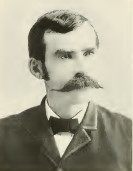 JOHN J.
FURLONG There are few happier and more comfortable
conditions of life than those enjoyed by the
prosperous Southern Minnesota farmer. That section
of the state contains a great many men successful
in agriculture, but probably none who have made a
greater success and have more to show for their
efforts in the way of a fruitful and
well-appointed farm than John J. Furlong, of Mower
County. His farm is three miles east of Austin,
and one of the most attractive establishments of
the kind in the whole state. JOHN J.
FURLONG There are few happier and more comfortable
conditions of life than those enjoyed by the
prosperous Southern Minnesota farmer. That section
of the state contains a great many men successful
in agriculture, but probably none who have made a
greater success and have more to show for their
efforts in the way of a fruitful and
well-appointed farm than John J. Furlong, of Mower
County. His farm is three miles east of Austin,
and one of the most attractive establishments of
the kind in the whole state.
Mr. Furlong is the
youngest son of William and Sarah Furlong, and was
born February 2, 1849, in Tipperary, Ireland. He
came to America with his parents when three years
old. His father preempted a quarter section of the
present farm in the fall of 1856, and in the
following spring moved his family into the little
log house which still stands on the farm as a
monument of the past.
John’s education was
begun in the district schools and continued in the
high school of Austin. He grew up on the farm and
adopted farming as his business; succeeded to the
ancestral estate, which he greatly enlarged, and
came to enjoy an enviable reputation among all his
neighbors, both as a businessman and as a
citizen.
Naturally of an active and progressive
temperament he became interested in politics in
1886, and was nominated by the Democrats as
representative to the legislature. He was elected
in a district that had always been largely
Republican, and in his first term in the house
caused his ability to be recognized and did good
work on the floor of the house, and as a member of
the committees on grain and warehouse, elections
and towns and counties. In 1890 he was nominated
by the Alliance party, endorsed by the Democrats
and elected.
In the session of 1891
he was the leading candidate of his party for
speaker, and would probably have been chosen had
he forced the issue; but to secure harmony between
the Alliance and the Democracy he withdrew his
name. He was, however, elected speaker pro tem and
filled the chair for a considerable portion of the
session during the illness of Speaker Champlin. He
was at this session chairman of the most important
committee of the house, the judiciary, also
chairman of the committee on flax fiber and twine.
In 1892 Mr. Furlong was again nominated by the
Democrats to the legislature, and elected. He was
re-elected in 1894, although only by the narrow
margin of three votes. His Republican opponent
contested the election, but Mr. Furlong retained
his seat after a protracted contest.
He has long been an
active member of the Farmers’ Alliance; has held
official positions in the local and national
organizations, and is now treasurer of the
national body. He has
been active in securing cheap and reliable
insurance for farmers, being one of the organizers
of the Mower County Mutual Fire and Hail Insurance
Company, and was for many years its president. He
is also president for the state of the Alliance
Hail and Cyclone Mutual Insurance Company. He was
president of the Mower County Agricultural Society
for five years, and placed that society on a
substantial financial basis. In 1891 he
was elected a director of the State Agricultural
Society; was superintendent of the dairy
department, and later superintendent of
agriculture. He was one of the board of World’s
Fair managers for the state, and treasurer of the
board. These facts go to show that Mr. Furlong has
led an active life, and that his ability has been
such sought after and employed in the public
interest.
He was married May 25, 1881
to Miss Agnes Ryan. They have four children:
William, May, Charles and Loretta. Mr. and Mrs.
Furlong are noted for their generous hospitality,
and take great pleasure in entertaining their
friends at their beautiful
home.
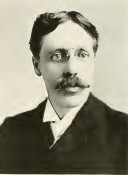 CHARLES HARCOURT JOHNSON of
Austin, Minnesota, is a Canadian by birth. He was
born in the county of Leeds, Ontario, on January
16, 1858. His early education was obtained at
Almonte, Ontario, and he later took a course in
the Collegiate Institute of that place under the
direction of the principal, P. C. McGregor, one of
the best masters in eastern Ontario. After leaving
school Dr. Johnson entered McGill University at
Montreal for the medical course and graduated in
1884. CHARLES HARCOURT JOHNSON of
Austin, Minnesota, is a Canadian by birth. He was
born in the county of Leeds, Ontario, on January
16, 1858. His early education was obtained at
Almonte, Ontario, and he later took a course in
the Collegiate Institute of that place under the
direction of the principal, P. C. McGregor, one of
the best masters in eastern Ontario. After leaving
school Dr. Johnson entered McGill University at
Montreal for the medical course and graduated in
1884.
In June of that year he
came to Austin, Minnesota, and at once stepped
into a good practice. Since then he has made rapid
advances and is said to have the most extensive
and lucrative practice in southern Minnesota.
Though still a young man he has already attained a
rank in the profession which insures him frequent
calls for important consultations. For the past
three years he has been chief surgeon for the
Chicago, Milwaukee & St. Paul Railroad at
Austin, which is the end of five divisions of the
line. In the spring of 1895 Dr. Johnson was
appointed president of the Pension Examining board
at Austin.
He has, however, been obliged to resign
this position on account of press of other
work.
Though so much absorbed in the practice of
his profession.
Dr. Johnson has found
some time for attention to politics, and has long
been prominent in the counsels of his party—the
Democratic—at Austin and in that vicinity. For the
past four years he has been mayor of Austin,
receiving the office by a heavy vote at each
election.
During his term of service the sewer system
of the city, the electric light plant, the
overhead bridge, the extension of the water works
system, new fire apparatus, high and other public
school buildings, cement sidewalks and a new
reservoir supplying artesian water are some of the
things which Austin has acquired. The term
of his service has been marked by continued
progress and prosperity for the city. Besides
the municipal works referred to, the city has
acquired new brick works, cement works and a flax
mill.
Dr. Johnson comes of a family
of physicians. Two of his brothers are in the
medical profession. In personal character Dr. Johnson is
companionable and generous, and his charities are
well known. He has his offices in a fine suite of
rooms in the center of the town. They are
equipped with everything needful for the practice
of his profession. including a large library and
plenty of apparatus. In religion Dr. Johnson is
an Episcopalian. He belongs to the Masons, Odd
Fellows, Knights of Pythias, A. O. U. W. and
Modern Woodmen of
America.
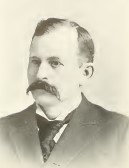 NATHAN CURTIS KINGSLEY is a
resident of Austin, Minn., where he is engaged in
the practice of law. His father, Alonzo Kingsley,
is a carpenter by trade, who enlisted in August,
1862, as a private soldier in the War of the
Rebellion and served until the close of the war in
the Fifteenth and Tenth Illinois Cavalry. Alonzo
Kingsley was a lineal descendant of one of three
brothers who emigrated from England in the early
Colonial days and settled in Vermont, and his
grandfather, Wareham Kingsley, was a private
soldier in the Revolutionary War. Alonzo Kinsley’s
wife was Marilla Cecelia Pierson, a direct
descendant of Stephen Pierson, who emigrated from
England in 1656 and settled at New Haven, Conn. NATHAN CURTIS KINGSLEY is a
resident of Austin, Minn., where he is engaged in
the practice of law. His father, Alonzo Kingsley,
is a carpenter by trade, who enlisted in August,
1862, as a private soldier in the War of the
Rebellion and served until the close of the war in
the Fifteenth and Tenth Illinois Cavalry. Alonzo
Kingsley was a lineal descendant of one of three
brothers who emigrated from England in the early
Colonial days and settled in Vermont, and his
grandfather, Wareham Kingsley, was a private
soldier in the Revolutionary War. Alonzo Kinsley’s
wife was Marilla Cecelia Pierson, a direct
descendant of Stephen Pierson, who emigrated from
England in 1656 and settled at New Haven, Conn.
The subject of this
sketch was born at Sharon, Litchfield County,
Conn., September 10, 1850. His family removed to
Illinois not long afterward, and Nathan received
his early education in the country district
schools. His first money was earned as a farm
laborer in La Salle County, 111. In March, 1869,
he came to Minnesota and was employed as a farm
laborer near Chatfield. In 1870 he learned the
miller’s trade and worked at that business in
Olmsted County until 1874, when he went to
Rushford, Minn., continuing his trade there until
February, 1877. While working as a miller he began
the study of law, and in November, 1876, was
admitted to the bar, though he did not give up his
trade until sometime afterward.
In February, 1877, he
formed a partnership for the practice of law with
C. N. Enos, under the firm name of Enos &
Kingsley, and opened an office at Rushford, where
he remained until December, 1878. He then
dissolved the partnership with Mr. Enos and
removed to Chatfield, where he formed a
partnership with R. A. Case. He continued the
practice of law at Chatfield until April, 1887,
when he removed to Austin, where he now resides.
While a resident of Fillmore County, in 1880 he
was elected county attorney, and in 1882 was
re-elected. Although solicited to accept a
re-nomination in 1884 he declined to be a
candidate. After dissolving partnership with Mr.
Case he formed a partnership with R. E. Shepherd,
which association still continues. From June,
1879, until his removal from Chatfield, he was
president of the board of education of that town.
Mr. Kingsley has been identified with considerable
very important litigation and has been
instrumental in establishing some important
principles of law.
Among other things the
fact that a bank certificate of deposit in the
ordinary form is, in substance and legal effect, a
promissory note, and that no demand is necessary
in order to set the statute of limitations running
against it (Mitchell vs. Easton, 37 Minn. 335”):
also that the legislature may provide for
constructive service of process in actions to
doctrine adverse claims to real estate where
personal service is impracticable, and may clothe
the district court with power to adjudicate the
title and ownership of real property upon such
constructive service (Shepard vs. Ware, 46 Minn.,
174): also that Chapter 196, of the Laws of 1887,
relating to the sale of foreign-grown nursery
stock in Minnesota, is in violation of the
constitution of the United States, as being an
attempt to regulate commerce among the states and
depriving citizens of other states of the
privileges and immunities of citizens of this
state.
Mr. Kingsley is a Republican
in politics, and has taken an active part in
public affairs for the last fifteen years. For
four years he was a member-at-large of the State
Republican Central Committee, and of the executive
committee of that body. He has been a delegate to
nearly all the state conventions for the last ten
years, and to nearly all other conventions in
which his county has been interested. He has
been a Free Mason for nearly twenty four years,
and is a member of a number of lodges of that
order; also of the A. O. U. W., the K. of P., the
Elks and the Masonic Veterans’ Association. He has
also laid important offices in the order of
Masonry, and in 1886 was Grand High Priest of the
Grand Chapter of Minnesota. He is at
present General Grand Royal Arch Captain of the G.
G. R. A. C of the United States. He is a
member of the Protestant Episcopal church. Mr.
Kingsley was married January 14, 1873, to Miss
Clara Smith, a native of New York. They have
one child, Cora
Marilla.
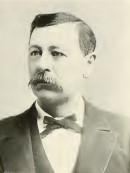 SAMUEL SWENINGSEN The people
of Mower County have shown their esteem for Samuel
Sweningsen by retaining him in office longer
probably than has ever been done before in the
case of any county officer in the state. Mr.
Sweningsen is of Norwegian descent, his father,
Mogens Sweningsen, and his mother, Mary Halversen
(Sweningsen), both natives of Norway, came to this
country in 1846. Mogens
settled in the town of Howard, Illinois, now
Durand, where he has continued to reside ever
since. His occupation in Norway had been that of a
carpenter and builder, but he engaged in farming
when he came to this country, and that has been
his occupation until compelled by old age to
retire from active work. He then settled in the
neighboring village of Durand, Illinois. SAMUEL SWENINGSEN The people
of Mower County have shown their esteem for Samuel
Sweningsen by retaining him in office longer
probably than has ever been done before in the
case of any county officer in the state. Mr.
Sweningsen is of Norwegian descent, his father,
Mogens Sweningsen, and his mother, Mary Halversen
(Sweningsen), both natives of Norway, came to this
country in 1846. Mogens
settled in the town of Howard, Illinois, now
Durand, where he has continued to reside ever
since. His occupation in Norway had been that of a
carpenter and builder, but he engaged in farming
when he came to this country, and that has been
his occupation until compelled by old age to
retire from active work. He then settled in the
neighboring village of Durand, Illinois.
His son, Samuel, was
born June 29, 1849, at Lanona, Winnebago County
Illinois. He received an education in the common
schools, Durand Seminary and Decorah, Iowa,
Lutheran College. In 1871 he located in Minnesota.
He was first employed on a farm near Zumbrota for
two years, when he moved to Mower County. In 1878 he
formed a partnership with Oscar N. Olberg,
now of Albert Lea, and engaged in the general
mercantile business. This firm operated at one
time three stores, located at Rose Creek, Adams
and Taopi on the line of the Chicago, Milwaukee
& St. Paul Railroad in Mower County. In 1880
this partnership was dissolved, and the following
year Mr. Sweningsen located at Austin, He formed a
partnership here with C. I. Johnson, in 1882, and
engaged in the boot and shoe business. This
partnership was dissolved in 1887, and disposing
of his interest to Mr. Johnson, who still
continued the business. Mr. Sweningsen engaged in
the jewelry trade. Subsequently he took a partner
by the name of Frederick E. Gleason.
They are still conducting the business, under the
firm name of Sweningsen &
Gleason.
Mr. Sweningsen is a
Republican. He was appointed postmaster of Adams,
Minnesota, by President Hayes in 1876. In 1881 he
was elected clerk of the district court in Mower
County, and re-elected in 1886 and 1890. He
occupied the position continuously for thirteen
years, and this is believed to be the only
instance on record in Mower County where a county
officer held a position continuously for that
number of years. In 1890 he
was nominated by the Republican party for
representative, but he declined on account of
being a candidate for clerk of court at the same
time. In 1894, while still a clerk of the district
court Mr. Sweningsen was nominated by the
Republicans for state senator, was elected and
served in the twenty—ninth session of the
Minnesota legislature. His present term expires
January 1, 1899. With the expiration of that term
Mr. Sweningsen will have completed as county
officer and representative seventeen years in the
service of Mower County.
He was married November 16,
1876, to Miss Margaret Carr. She was born in
Dundee, Illinois, January 15, 1855. Mr. and Mrs.
Sweningsen have three children, Stella May, Oliver
and William.
The information
on Trails to the Past © Copyright may be used in personal family history research, with source citation. The pages in entirety may not be duplicated for publication in any fashion without the permission of the owner. Commercial use of any material on this site is not permitted. Please respect the wishes of those who have contributed their time and efforts to make this free site possible.~Thank you! |



